|
|
|
Sort Order |
|
|
|
Items / Page
|
|
|
|
|
|
|
| Srl | Item |
| 1 |
ID:
145509
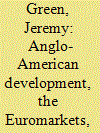

|
|
|
|
|
| Summary/Abstract |
This article challenges existing accounts of the development of the Euromarkets by arguing that their emergence constituted the foundational moment in the advent of a postwar Anglo-American developmental field. The account contends the notion of a postwar order shaped predominantly by the outward expansion of American financial power, by deprivileging the exclusivity of American power and arguing that co-constitutive Anglo-American developmental processes were the generative force that produced the Euromarkets. Drawing upon new archival material, the article suggests that an Anglo-American developmental sphere, in which Britain continued to play a crucial but subordinate role, was key to the unfolding of postwar financial globalisation. The Anglo-American developmental processes occasioned by the Euromarkets gave rise to a ‘transatlantic regulatory feedback loop’ that stimulated deregulation on both sides of the Atlantic and placed Anglo-American capitalist interdependence at the centre of the politics of globalisation. The deeper origins of financial deregulation lie in the transformation of Anglo-American finance during the 1960s.
|
|
|
|
|
|
|
|
|
|
|
|
|
|
|
|
| 2 |
ID:
145513
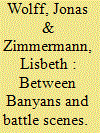

|
|
|
|
|
| Summary/Abstract |
In studying the global spread and implementation of liberal norms, scholars have moved from linear notions of norm diffusion and promotion to an emphasis on norm contestation. Contestation by the supposed beneficiaries and addressees has taken centre stage in both research on the norms that underpin global governance and in studies on democracy promotion and liberal peacebuilding. While the impetus of this scholarship is normative – to overcome the taken-for-granted nature of liberal norms – the concept of contestation itself is mainly used with an analytical interest. Yet, as we show in this article, contestation also comes with – oftentimes implicit – normative connotations. Focusing on the seminal work of Milja Kurki, Oliver Richmond, Antje Wiener, and Amitav Acharya, we reconstruct these normative connotations. It turns out that the normative take on contestation is fairly conventional in all four approaches. Contestation is largely seen as a means to enable dialogue, as illustrated by Acharya’s metaphor of the Banyan tree. Fundamental conflicts over liberal norms (‘battle scenes’) are either not considered or seen as normatively undesirable. As a way forward, we propose a typology that enables scholars to empirically analyse contestation in its different expressions and suggest two strategies to normatively assess practices of contestation.
|
|
|
|
|
|
|
|
|
|
|
|
|
|
|
|
| 3 |
ID:
145510


|
|
|
|
|
| Summary/Abstract |
While the historical turn in IR has produced significant advances in historicising both international relations and the discipline itself, the way in which the Middle Ages have been approached, studied, and referenced even in this historically-informed scholarship unwittingly works to reinforce two myths that these scholars challenge: Eurocentrism and Orientalism. The main goal of this article is to problematise the uses of the medieval that reinforce these narratives by unpacking the linguistic and conceptual constructions that underpinned the interactions between Latin Christendom and rest of the world. In doing so, it makes two closely-connected arguments: first, drawing from the abundant literature on historical sociology and Eurocentrism, it argues that we cannot understand medieval Europe, and particularly European identity-formation, without paying attention to its relations with the non-Christian world. Secondly, and most crucially, it shows that these interactions never rested on the unified idea of an ‘infidel enemy’ that seems to emanate from the IR crusading literature. Rather, an examination of the constructions of Jews and Muslims in canon law shows an extremely nuanced and varied conceptual apparatus that creates several dynamics of Othering – and consequently allows for a variety of ways of relating ranging from toleration and coexistence to conquest.
|
|
|
|
|
|
|
|
|
|
|
|
|
|
|
|
| 4 |
ID:
145512
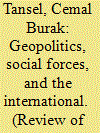

|
|
|
|
|
| Summary/Abstract |
This article contributes to current debates in materialist geopolitics and contemporary IR theorising by restating the centrality of social forces for conceptualising geopolitics. It does so by offering a detailed conceptual reading of the corpus of the ‘Eastern Question’, which is composed of a series of political analyses written by Marx and Engels in the period of 1853–6. This archive presents unique analytical and conceptual insights beyond the immediate temporal scope of the issue. I unpack this argument in three movements. The article (i) offers an overview of the debates on materialist geopolitics; (ii) contextualises the historical setting of the ‘Eastern Question’ and critically evaluates the great powers’ commitment to the European status quo; and (iii) constructs an original engagement with a largely overlooked corpus to reveal the ways in which Marx and Engels demonstrated the interwoven relationship between domestic class interests, the state, and the international system. I maintain that revisiting the ‘Eastern Question’ corpus (i) bolsters the existing materialist frameworks by underscoring the role of class as an analytical category; (ii) challenges an important historical pillar of the balance of power argument; and (iii) empirically strengthens the burgeoning scholarship in international historical sociology.
|
|
|
|
|
|
|
|
|
|
|
|
|
|
|
|
| 5 |
ID:
145508


|
|
|
|
|
| Summary/Abstract |
Karl Polanyi is principally known as an economic historian and a theorist of international political economy. His theses are commonly encountered in debates concerning globalisation, regionalism, regulation and deregulation, and neoliberalism. But the standard depiction of his ideas is based upon a highly restricted corpus of his work: essentially, his published writings, in English, from the 1940s and 1950s. Drawing upon a broader range of Polanyi’s work in Hungarian, German, and English, this article examines his less well-known analyses of international politics and world order. It sketches the main lineaments of Polanyi’s international thought from the 1910s until the mid-1940s, charting his evolution from Wilsonian liberal, via debates within British pacifism, towards a position close to E. H. Carr’s realism. It reconstructs the dialectic of universalism and regionalism in Polanyi’s prospectus for postwar international order, with a focus upon his theory of ‘tame empires’ and its extension by neo-Polanyian theorists of the ‘new regionalism’ and European integration. It explores the tensions and contradictions in Polanyi’s analysis, and, finally, it hypothesises that the failure of his postwar predictions provides a clue as to why his research on international relations dried up in the 1950s.
|
|
|
|
|
|
|
|
|
|
|
|
|
|
|
|
| 6 |
ID:
145515
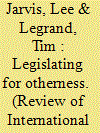

|
|
|
|
|
| Summary/Abstract |
This article offers a discursive analysis of UK Parliamentary debate on the proscription of terrorist organisations between 2002 and 2014. It argues that these debates play an important constitutive role in the (re)production of national Self and terrorist Other that remains largely overlooked in existing work on this counter-terrorism mechanism. The article begins with an overview of this literature, arguing it is overwhelmingly oriented around questions of efficacy and ethics. While important, this focus has concentrated academic attention on the causal question of what proscription does, rather than the constitutive question of what is made possible by proscription. The article’s second section situates our analysis within discursive work in International Relations, upon which we investigate three pervasive themes in Parliamentary debate: (i) Constructions of terrorism and its threat; (ii) Constructions of specific groups being proscribed; and, (iii) Constructions of the UK Self. We argue that these debates (re)produce an antagonistic relationship between a liberal, open, and responsible UK mindful of cultural and religious difference, on the one hand. And, on the other, its illiberal, irrational terrorist Others conducting immoral violences on behalf of particularistic identity claims. This analysis, we conclude, has significance for contemporary debate on security politics, as well as for studies of counter-terrorism and international politics more generally.
|
|
|
|
|
|
|
|
|
|
|
|
|
|
|
|
| 7 |
ID:
145511


|
|
|
|
|
| Summary/Abstract |
A growing literature in IR addresses the historical international politics of East Asia prior to Western influence. However, this literature has taken little note of the role of Eurasian steppe societies and empires in these dynamics. This article offers a corrective, showing that relations between China and the steppe played an important role in regional politics. I argue that Chinese elite conceptions of the steppe as other played an important role in maintaining China’s ontological security. Imperial Chinese elites pursued a deliberate strategy of ‘othering’ steppe societies, presenting them as China’s political-cultural opposite. Doing so both provided a source of stable identity to China and justified their exclusion from the Chinese ‘world order’. Empirically, I proceed in three sections. First, I consider Chinese identity building, framed in terms of ontological security, both under the founding Qin and Han dynasties, and under the later Ming dynasty. Second, I address recent historiography of the steppe, showing Chinese conceptions of it were inaccurate. Third, I address the long history of hybridity between the two regions.
|
|
|
|
|
|
|
|
|
|
|
|
|
|
|
|
| 8 |
ID:
145507


|
|
|
| 9 |
ID:
145514


|
|
|
|
|
| Summary/Abstract |
The article presents a top-down approach to the study of the empirical legitimacy of international institutions. It starts from the observation that international institutions’ representatives are engaged in various strategies aimed at cultivating generalised support. The article asserts that such strategies should be taken into account to gain deeper insights into the legitimation process of international institutions. To systematise these legitimation efforts and facilitate their empirical analysis, the article introduces the concept of legitimation strategies, which are defined as goal-oriented activities employed to establish and maintain a reliable basis of diffuse support. An analytical differentiation between three types of legitimation strategies is introduced depending on the addressees of legitimation strategies, that is, member state governments, international institutions’ staff, and the wider public. The applicability of the concept and the relevance of legitimation strategies for international institutions’ communication, behaviour, and institutional design is demonstrated by an empirical analysis of the G8’s and the IMF’s reaction to legitimation crises in the recent past of both institutions. In addition, the case studies suggest that a balanced set of legitimation strategies that takes into account the legitimacy concerns of all three constituencies is more likely to be successful in improving legitimacy perceptions.
|
|
|
|
|
|
|
|
|
|
|
|
|
|
|
|
| 10 |
ID:
145516
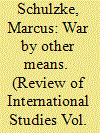

|
|
|
|
|
| Summary/Abstract |
The 2014 Israel-Gaza Conflict inspired the creation of over a dozen games for mobile phones and tablets. These games, which allowed players to Bomb Gaza City, operate the Iron Dome missile defence system, and direct rockets into Israeli settlements, marked an important shift in the mediatisation of war in three ways. First, whereas propaganda is frequently described as a top-down process by which elites influence mass audiences, the mobile war games about Gaza were created by non-elite indie game developers, thereby illustrating these games’ capacities for allowing new actors to participate in ideological contestation. Second, the games were not simply reflections on the conflict, but part of it. They were released while the fighting was in progress and helped to constitute the ideological battleground. Finally, the games reproduced established propaganda techniques in distinctive ways that were shaped by the mobile gaming medium.
|
|
|
|
|
|
|
|
|
|
|
|
|
|
|
|
|
|
|
|
|